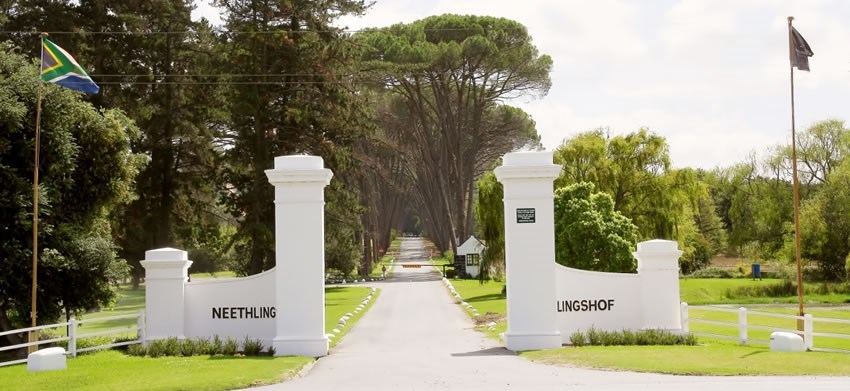
According to legend the French Huguenots brought the kernels of the stone pine tree to the Cape of Good Hope during the late 17th century and planted it so that these trees could remind them of France. We do not know if this story is true, but perhaps Neethlingshof's famous avenue of stone pines originated from the 17th-century kernels.
Neethlingshof was formerly known as De Wolvedans and was granted in 1692 by Governor Simon van der Stel to a German immigrant, Barend Lubbe. The small farm situated on Polkadraai Road was originally only 29 morgens, but today the historic farm covers 284 acres of arable land.
The estate is currently in the process of extensive replanting and the aim is to establish 160 hectares of vineyards by 2024. The focus is on planting cultivars such as Chenin blanc, Sauvignon blanc, Chardonnay, Pinotage, Cabernet Sauvignon, and Cabernet franc.
Neethlingshof believes it is important that employees take advantage of all opportunities available in the industry and that knowledge development is an important aspect of the estate's philosophy.
Therefore, the Neethlingshof cellar team has since 2009 been a regular participant in the Cellar Assistants’ Programme as the programme adds value to cellar assistants' practical knowledge. Participation in the program is a win-win situation for all, as cellar assistants' knowledge is increased to enable cellars to deliver a quality product.
It has been established that participating in the programme improves productivity and increasingly results in the self-empowerment of cellar assistants. Regular participation in the programme encourages discussions between cellar management and cellar assistants, as questions lead to further knowledge transfer. The involvement in the Cellar Assistants’ Programme certainly promotes communication and at the same time strengthens informal mentoring relationships.
Neethlingshof believes that individual development starts with children at a grassroots level.
When Hans Schreiber bought the farm in 1985, it was his vision to create a positive future for Neethlingshof's employees and their families. He began by improving the infrastructure for the farm worker community, while simultaneously establishing a solid foundation for healthy employer-employee relationships.
The clinic on the farm takes care of the physical well-being of the employees and social workers provide ancillary services.
The registered crèche and aftercare ensure that the children's development is put on a solid footing and that they reach their milestones. The Anna Foundation is involved in the crèche and aftercare, which means that apart from schoolwork, there is also a focus on sport. The expression "a healthy body houses a healthy mind" is applied in the crѐche and aftercare.
Training in general may occasionally present challenges. For example, training is not always available in participants' mother tongue. Some available training is not sufficiently focussed on the subject and course content can sometimes be presented too extensively. Winemakers believe that some of the subjects can be discussed more in-depth and need to explain why certain actions are important in the cellar.
The information days and senior cellar assistants’ workshops, which the Cellar Assistants Programme currently offers, are experienced positively and participation encourages cellar assistants to ask questions. The content of the programme is perceived as relevant and meaningful, especially as industry service providers are also involved in the presentation of the programme.
Neethlingshof is committed to the development of future leaders, but it is a slow process and a journey shared by the mentor and the individual. Management must understand the needs and circumstances of each employee, not only those of future leaders. Employees' successes largely depend on their circumstances and therefore sufficient support must be in place for everyone. Management needs to know employees well enough to identify challenges, but it is equally important to have empathy so that the individual can manage his or her insecurities successfully.